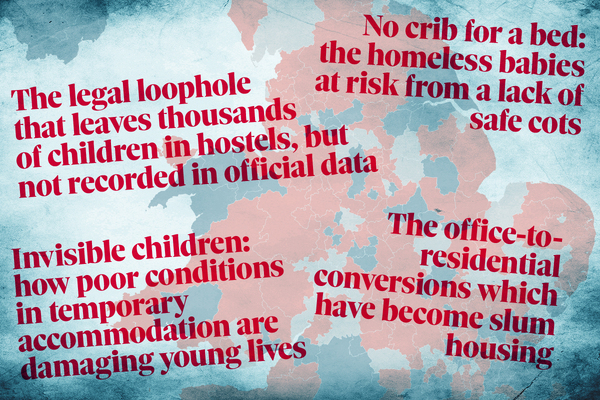You are viewing 1 of your 1 free articles
 Gemma Duggan
Gemma DugganThe Thinkhouse review: a must-read series of essays on homelessness
In the Thinkhouse summary of housing research for March, Gemma Duggan recommends a collection of essays predicting what homelessness will look like in 2030
Thinkhouse is a website set up to be repository of housing research. Its editorial panel of economists, chief executives, consultants and academics critiques and collates the best of the most recent housing research (scroll down for more information).
The nine housing-based research reports released last month cover a huge range of topics, but if you are looking for a piece to read, I’d suggest the one I picked up last and then read cover to cover: Homelessness in 2030 by the Y-Foundation, first published on the FEANTSA (European Federation for Homelessness Organisations) website.
This is a collection of very short but creative and well-researched essays. All are engaging and some are inspiring.
They focus on what homelessness will mean in 2030, and are all written by experts from different countries.
They are all distinctive, giving creative insight on different aspects of homelessness and housing policy.
There is an essay to suit everyone, including a tongue-in-cheek analysis of the social and economic benefits of homelessness, based on sociologist Herbert Gans’ 1972 analysis, which argued that the European ‘smart cities’ miss now they have eradicated homelessness.
“The essays are all distinctive, giving creative insight on different aspects of homelessness and housing policy”
Another looks at a dystopian world after homelessness is made illegal and where that leads.
One essay is written from the perspective of a previously homeless person.
It tells how he still has flashbacks of the feeling of cardboard as a mattress and contains commentary on practical aspects such as a world where access to social services is app-based, yet you cannot get a grant for a smartphone.
Some of the essays are positive – these credit the eradication of homelessness to a number of options. One being a universal income and another the creation of an NHS for housing, called the “Housing Stabilization Service”.
The essay by Suzanne Fitzpatrick focuses on homelessness in Great Britain in 2030, although not through imagined scenarios, because in her words we don’t need to make “speculative guesses” – we have the research base to know what it will look like in 2030 (spoiler alert: for England, it isn’t good).
Ms Fitzpatrick also focuses on the dangers of talking about the issue as complex, and on the fact that it could happen to anyone.
She concisely demonstrates that research shows a direct causation between poverty, especially childhood poverty, and homelessness.
So while it could happen to anyone, it is 71% more likely to happen to mixed-ethnicity females who experienced poverty in childhood, left school at 16 and were brought up by a lone parent.
She demonstrates that tackling homelessness is difficult but not unfathomable, as so much quality research has been done showing the trajectory and causes of homelessness in the UK.
Alongside Homelessness in 2030, there were some other noteworthy reports published last month. Some are short, such as the National Housing Federation’s briefing on poverty and the private rented sector.
In 12 pages of text and statistics, it effectively demonstrates that housing costs in the private rented sector increase poverty and argues that 71% of households in the private rented sector would be better off in social housing.
Some are more substantial, such as Alison Wallace’s in-depth and detailed research on the shared ownership market outside London and the South East.
It’s worth a read for housing providers operating in that market, as it provides insight into the motivations of potential buyers and current constraints of the shared ownership market. However, be warned that full stops were used sparingly!
St Mungo’s Home for Good is a well-researched, well-articulated case for floating support services and how they are needed to end rough sleeping.
The research I found most useful, working in the retirement housing business, was the Centre for the Study of Financial Innovation’s The Last-Time Buyer, which considers data on household, financial and demographic trends to make a number of recommendations to support a greater focus on housing for those aged over 65 in order to provide more suitable accommodation and free up family housing.
So this month, if you work in a certain part of the sector, read the publication on the topic relevant to you. If you are a politician or civil servant, please read them all, but if you have time to read only one, read Homelessness in 2030.
Gemma Duggan, head of compliance and improvement, The ExtraCare Charitable Trust, and editorial panel member, Thinkhouse
What is Thinkhouse?
Thinkhouse was formally launched in spring 2018, and aims to “provide a single location and summary of the best and most innovative research pieces, policy publications and case studies”.
It specifically looks at reports that propose ways to boost the amount and quality of housing and the economic, social and community issues of not doing this.
The Thinkhouse editorial panel highlights the ‘must-read’ reports, blogs about them and runs the annual Early Career Researcher’s Prize.
The panel includes current and former housing association chief executives, academics, lawyers, economists and consultants. It is chaired by Richard Hyde, chief executive of a business that sells construction hand tools.
Who is on the panel?
Richard Hyde | Chair of Editorial Panel, CEO of HYDE |
Gemma Duggan | Head of Compliance and Performance at Extracare |
Chris Walker | Economist |
Brendan Sarsfield | CEO, Peabody |
Mick Laverty | CEO, Extracare Charitable Trust |
Martin Wheatley | Senior Fellow, Institute for Government, |
Kerri Farnsworth | Founder & MD, Kerri Farnsworth Associates |
Suzanne Benson | Head of Real Estate for the Manchester office of Trowers. |
Burcu Borysik | Policy Manager at Revolving Doors Agency, |
Ken Gibb | Professor in housing economics at the University of Glasgow, Director of CaCHE |
Peter Williams | Departmental Fellow, Department of Land Economy, University of Cambridge |
Brian Robson | Executive Director of Policy and Public Affairs at the Northern Housing Consortium |
Francesca Albanese | Head of Research and Evaluation at Crisis |
Jules Birch | Journalist and blogger |
Susan Emmett | Head of Engagement for Homes England |
Mark Farmer | Founder and CEO Cast Consultancy |
Steve Moseley | Group Director of Governance, Strategy & Communications at L&Q |
Jennifer Rolison | Head of marketing at Aquila Services Group |
Philip Brown | Professor of Housing and Communities at the University of Huddersfield |
Anya Martin | Senior researcher at the National Housing Federation |
Emily Pumford | Policy & strategy advisor, Riverside |
Anthony Breach | Analyst, Centre for Cities |
Shahina Begum | Customer Insight Office, Peabody |














